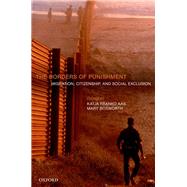The Borders of Punishment: Migration, Citizenship, and Social Exclusion critically assesses the relationship between immigration control, citizenship, and criminal justice. It reflects on the theoretical and methodological challenges posed by mass mobility and its control and for the first time, sets out a particular sub-field within criminology, the criminology of mobility. Drawing together leading international scholars with newer researchers, the book systematically outlines why criminology and criminal justice should pay more attention to issues of immigration and border control.
Contributors consider how 'traditional' criminal justice institutions such as the criminal law, police, and prisons are being shaped and altered by immigration, as well as examining novel forms of penalty (such as deportation and detention facilities), which have until now seldom featured in criminological studies and textbooks. In so doing, the book demonstrates that mobility and its control are matters that ought to be central to any understanding of the criminal justice system. Phenomena such as the controversial use of immigration law for the purposes of the war on terror, closed detention centers, deportation, and border policing, raise in new ways some of the fundamental and enduring questions of criminal justice and criminology: What is punishment? What is crime? What should be the normative and legal foundation for criminalization, for police suspicion, for the exclusion from the community, and for the deprivation of freedom? And who is the subject of rights within a society and what is the relevance of citizenship to criminal justice?








